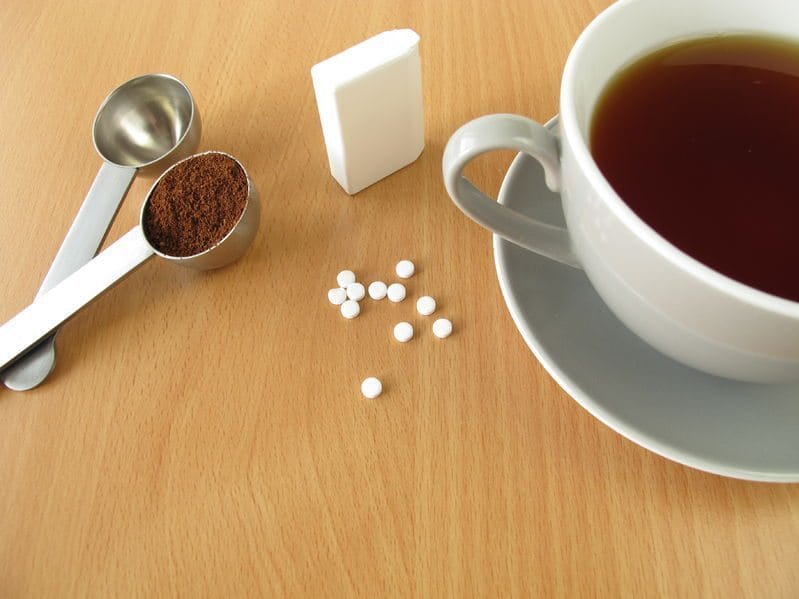
[cmamad id=”4455″ align=”center” tabid=”display-desktop” mobid=”display-desktop” stg=””]
There is an old joke about cottage cheese.
You may recall as a kid when all the adults would eat “diet” foods.
They’d eat cottage cheese because they thought it was “slimming.”
So, in the joke, a man says to his buddy, “I would not eat cottage cheese, it makes you fat.”
The other man says, “Why do you say that? It’s low in fat, why would cottage cheese make you fat?”
“Because look at all the fat people eating cottage cheese,” the first man says.
“Everyone who eats cottage cheese is fat, so, therefore, it makes you fat.”
That rational doesn’t always work.
But it just might work with artificial sweeteners.
In today’s newsletter, the study looks at questions about sugar substitutes.
Does artificial sweetener make you fat? Or is sweetener healthier than sugar?
Perhaps people are already obese tend to eat artificial sweeteners.
People think that these fake sugars help them lose fat.
But I’ve shown you many studies before, that show higher sugar consumption correlates with lower body fat.
So this new study shows that artificial sweeteners may, in fact, contribute to obesity.
And it also shows a possible mechanism for the problem.
[cmamad id=”4456″ align=”center” tabid=”display-desktop” mobid=”display-desktop” stg=””]
Before we get into that, let’s talk about the approval process for these chemical food additives.
You would be shocked at how little study goes into approving drugs.
But even worse is the lack of study that goes into approving high-tech new chemical food additives.
The food companies all try to get the additive approved as “generally recognized as safe.”
This leaves room for the potential that not everyone “should” eat it, but that it won’t hurt most people.
How reassured do you feel now? Me, either.
However, if the additive is very novel, it will have to undergo some approval and safety testing.
However, the quantities of these kinds of additives are much higher in the average person’s diet than the amount of medication that they may take.
Let’s look at this.
If you’re on medication, you take what doctors like to call the “lowest effective dose.”
This is the smallest dose of the drug that has the effect the doctor is looking for.
The doctor won’t continue to raise your dose because that’s considered an overdose.
But when it comes to things we eat, there are no controls on how much you can consume in a day.
Someone may drink 10 or 15 diet sodas per day.
They are consuming vast amounts of sucralose (Splenda) with all of these sodas.
And NO, it is not “made from sugar.” It is a completely artificial sweetener.
But the point is that there is no one to tell you that you should only eat so many grams of sucralose per day.
It’s in your food, so you assume it’s just as safe as over-eating anything else.
That’s why this study is very important.
The researchers discovered a major problem with these fake sugars.
It turns out there are some serious side effects of artificial sweeteners.
They have answered the question, “is sugar substitute bad for you?”

And the answer is, “YES.”
Here is what the researchers found happens in the body when it processes sugar substitutes.
The artificial sweeteners get transmitted into the bowel.
The bowel contains the bacteria and yeast that help you digest your food.
The artificial sweeteners go on to modify these bacteria and yeast.
This alteration can be good or bad — but it is most often bad.
We found significant positive correlations between NAS consumption and metabolic-syndrome-related clinical parameters including increased weight and waist-to-hip ratio higher fasting blood glucose, oxidized haemoglobin (HbA1C%) and glucose tolerance test (GTT, measures of impaired glucose tolerance), and elevated serum alanine aminotransferase (ALT, measure of hepatic damage that is likely to be secondary, in this context, to non-alcoholic fatty liver disease).
Moreover, the levels of glycosylated haemoglobin (HbA1C%), indicative of glucose concentration over the previous 3 months, were significantly increased when comparing to non NAS consumers (236 individuals, Fig. 4a, rank sum P , 0.002).
This increase remained significant when corrected to body mass index (BMI) levels
That’s a lot of information, so here’s what they’re saying.
People who use a lot of artificial sweeteners in their diet tend to be obese and unhealthy.
The researchers did try to figure out why this is the case.
They found that artificial sweeteners make you fat and unhealthy because artificial sweeteners mess up the bacteria and yeast in the gut.
Since these bacteria and yeast cannot do their job, they don’t metabolize food properly.
This creates a greater propensity to obesity.
In other words, artificial sweeteners and weight gain go hand in hand.
This is obviously just one study, but there are plenty others.
I choose not to have any artificial sweeteners in my diet.
I’ve done a lot of study that leads me to believe sugar is a valuable addition to the diet.
And I believe that artificial sweeteners have not been tested nearly enough.
I believe that many are quite harmful, and I believe that they should not be consumed at all.
You may or may not agree with me, but this study certainly does.

http://genie.weizmann.ac.il/pubs/2014_nature.pdf
